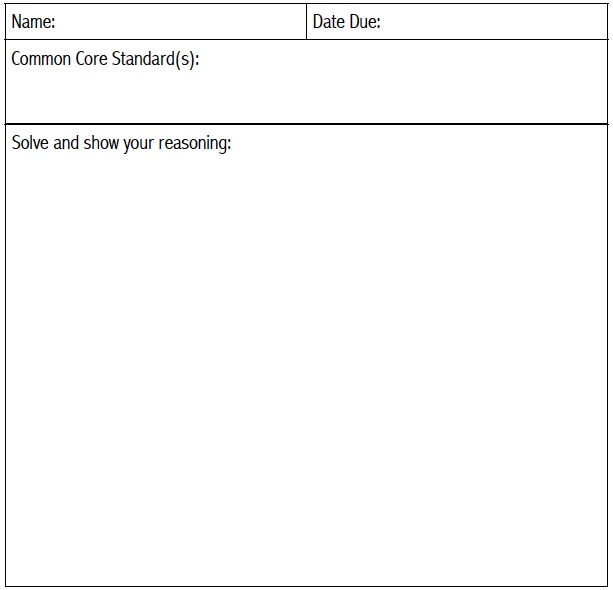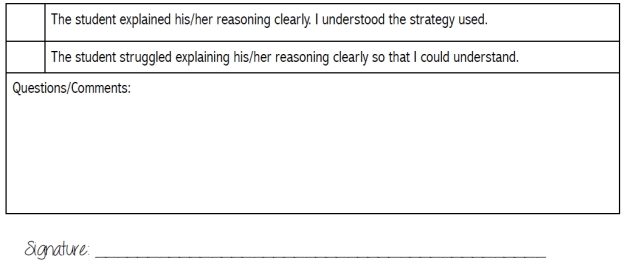One of the things on my vacation “To-Do” list is to rethink the way I do homework in my classroom. The concept of homework is something I constantly go back and forth with in my head, trying to find the perfect balance of meaningfulness for my students.
Some things I have learned, loathed, and/or questioned about homework…
- More problems does not equate to more meaningful. If a student can do 2 problems correctly, chances are they can do 20. Conversely, if they can’t do 2, 20 will be extremely painful.
- Some parents will want more homework, some will want less. This is not necessarily based on any particular demographic, it is varying. I find this more stems from parents reflecting on their own school experience and homework load. What they believe makes students “better math students.”
- Some students will have help (resources) at home and others will not. Then I end up grading/giving feedback on parent’s work or work that has been corrected by the parents vs the students that did it completely alone. Not equitable in my eyes.
- Some will never remember to bring their homework home and if they do, will lose it on the way back to school. So, then I feel like I am grading a student on responsibility and not their math understanding.
- Homework should be meaningful, however what is meaningful varies from student to student. How can I make it meaningful for the 45 individuals in my math classes?
- Homework can be beneficial to involve parents in what is being learned in class. I do newsletters and parent math nights, but really homework seems more accessible. I want students talking math their parents and questions that may arise from parents. Homework can open those doors, but I don’t want it opened in a negative “my child couldn’t do this and I had to show them how I solve it” kind of way.
- Am I doing the students a disservice if they hit 6th grade and beyond and the homework load increases dramatically on them? Am I responsible for “preparing” them for what will happen in future grades? (whether it be best practice or not).
- I feel there is benefits to students being held accountable for completing assignments outside of school. From time management to the organization and responsibility of completing a task are life skills that I feel are extremely important. But, how do grade/give feedback to those skills? If it doesn’t somehow “count,” some students will not really have the motivation to do it.
- I feel like the time spent grading/giving feedback on homework could be better utilized in planning upcoming lessons.
This list could go on and on, but for the sake of time and actually being able to check something (actually two things bc blogging was also on there) off my to-do list, here is what I have come up with thus far…
I will assign one or two problems for students to solve and explain their reasoning. I will attach those problems to applicable standard(s) (including the Math Practices) so parents who would like, can see why certain things are being done in class. I will have it due over a few day period so students can manage their time and organization. Hence leading to the first part of the page:
Now the second part is hard because I am trying to break a mindset. I want the students to explain their reasoning to the problem and parents (or any adult) to check off whether the student could explain it clearly or not. NOT FIX IT! Then I left a box for any questions or concerns for me… second part:
I am hoping this offers as more of a formative assessment for me that connects parents to the learning in our classroom. For the students who do not always have parents available, any adult will do…this way the students could use one of their other teachers in school that they see each day.
I am also hoping that by having students explain their reasoning to someone other than me (because most times I “get where they are coming from mathematically”) it will force them to be accurate and clear in their explanations, putting a big emphasis on the Math Practices.
I am hoping this opens more communication between the parents who I may not have reached the first half of the year.
I am hoping this gives me more time to focus on planning and instruction time than grading or going over homework assignments.
As always, a work in progress. Any thoughts are appreciated!
Now, time to check two things off my list…for now..
-Kristin


Love this approach! I don’t teach math but struggle with the same questions with ELA. I give weekly assignments to build time management but it is linked to vocabulary and reading standards. My biggest worry is also if it is beneficial in student development of responsibility. I found that I had to teach them how to break down their work and set up a plan to complete their work that can be successful with their home schedule. However, am I grading content or completed work? Which is my goal? If I don’t show them time management skills will others? It is so important in life to have success in time management so if that is my goal then how is that graded with our old school report cards?
LikeLike
Thanks Kim! I actually took inspiration for the reading logs students do where parents sign, but think it is more important that they are talking with someone about it. Whether it is what they read or do in math, that is the most valuable piece in my mind! Grades are the biggest obstacle!!
LikeLike
I like this Kristin. It does make sense that explaining to another adult, especially one that is not “mathematical” would make their explanation stronger. Thank you for this.
LikeLike
Kristin,
Great blog post. Very interested to see how your approach works for students and parents. How will you handle the “check” for students without parental support?
I also understand your comment about the concern over preparing students for future grades. I liked Rick Wormeli’s answer to that. He states we should never be pressured into using poor pedagogy in an effort to prepare students for future poor pedagogy.
LikeLike
Joe,
Thank you for the response! I am opening up the check to any adult with the thought that if they don’t have support at home, they always have the teachers at school. I think it would be amazing for them to explain the problem to the music or art teacher. Also, many go to “after school programs” until parents get off work that are run by supportive adults. This is all trial, so we shall see how it works!
Thank you for the pedagogy reference. In my heart I know, yet hard to fight that sometimes.
Thank you,
Kristin
LikeLike
Pingback: Rethinking Homework Pt 2 | Math Minds
I like the idea of making explanation part of the process, though I do wonder if this will be a problem for the non-verbal math whiz — now they are the ones who will hate math! 🙂
I also have doubts about your two versus twenty reasoning, and the concern over the grading burden. Here is where blended learning comes in: automate the “grading” by having students practice in a suitable application. They will spend more time on task because they need not copy problems from a book oo worksheet onto paper.
Even better, the feedback is immediate. This addresses the concern over doing twenty problems incorrectly: as soon as they make a mistake they will know it, and decent software will help them correct it.
My final concern is whether two problems establishes our learning goals. First of all, on any given math skill, and more so as the skill complexity increases, different problems will present different challenges. We first need a sufficient number of problems to cover all the different variants.
We then need enough problems to move from a present, conscious understanding of a technique to the point where it has become internalized. Math is cumulative, so as students advance they will be expected to execute earlier skills fluently, without struggling to recall what will be forgotten if they just do two problems and move on to the next skill.
Does this have to be homework? No. Students could use the software in class, proceed at their own pace, and engage the teacher only as they got to new skills or when a skill proved especially challenging. The efficiency of the automated practice I think would obviate the need for homework. Yeah!!!
LikeLike
Thank you so much for your comments. I believe you have made a few assumptions about the work in my classroom through this assignment as well as hold a differing belief about technology in math than I. These assignments are not the only exposure my students have with these concepts and building fluency is not my goal in this work. I don’t see these assignments as skills to be passed through, but instead tasks in which students can problem solve. I think communicating mathematically is very important for students and working on software does not, for me, always accomplish that goal in the context of your comment. I prefer engaging with my students through mathematical discourse as a whole class, small groups and individually, and working on a computer through skills is not my vision for the class. This assignment is always a work in progress so I thank you for things to think about, however I think we also have to truly think about how to better involve parents in our work.
LikeLike